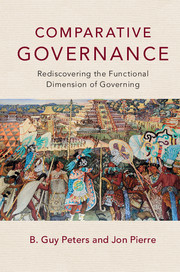Book contents
- Frontmatter
- Contents
- Preface
- 1 The Governance Problem
- 2 The Theory of Governance
- 3 Decision–Making: The Essence of Governing
- 4 Governance and Comparative Politics
- 5 The Institutional Politics of Inter–governmental Relationships
- 6 Implementation, Administration, and Governance
- 7 Governance Failure, Functional Failure, and State Failure
- 8 The Change of Governance and the Governance of Change
- 9 Conclusions: Governance, Functionalism, and Comparative Politics
- References
- Index
6 - Implementation, Administration, and Governance
Published online by Cambridge University Press: 05 September 2016
- Frontmatter
- Contents
- Preface
- 1 The Governance Problem
- 2 The Theory of Governance
- 3 Decision–Making: The Essence of Governing
- 4 Governance and Comparative Politics
- 5 The Institutional Politics of Inter–governmental Relationships
- 6 Implementation, Administration, and Governance
- 7 Governance Failure, Functional Failure, and State Failure
- 8 The Change of Governance and the Governance of Change
- 9 Conclusions: Governance, Functionalism, and Comparative Politics
- References
- Index
Summary
Administration is the forgotten aspect of the state in the governance literature. The emergence of new forms of governance shifted scholarly attention from the internal processes of government to its interaction with societal partners. Indeed, for some scholars, the fundamental idea of governance is that the internal processes of government become less important than the involvement of nongovernmental actors. Further, to the extent that government itself was still of any interest, it related far more to the changing role of elected officials than to the public bureaucracy.
Several observers have bemoaned the decline of interest in public administration in governing, arguing that public administration is an essential institutional component of democratic governance and therefore deserves its due attention in governance studies (see Frederickson, 2007; Peters, 2001a; Peters and Pierre, 1998; Suleiman, 2003). As this chapter will demonstrate, the public bureaucracy is an important actor in the execution of all governance functions; indeed, in some cases, the key actor. Although implementation is the usual function associated with the public bureaucracy, it is also involved in other aspects of governing.
The governance literature concerns itself overwhelmingly with issues related to responsiveness, steering, democracy, accountability, and collaboration. As we argued in the introductory chapter of this book, the emergence of “new” forms of governance drove many scholars to focus almost exclusively on societal partners or possibly on exchanges between elected officials and those partners. This became all the more ironic as the public bureaucracy by design is the primary executive interface between state and society. Instead, much of the governance literature focused on various forms of collaboration between public and private agents with particular attention to the purportedly novel role of societal actors in providing public governance.
If thus the governance “turn” in mainstream political science meant that the public administration fell from many political scientists’ attention, the market-inspired public management reform that was conducted under the heading of the New Public Management (NPM) gained significantly more interest. There are now numerous accounts of the introduction of NPM and there is little need for us to rehearse that literature here (Hood, 1991; Pollitt and Bouckaert, 2011; Savoie, 1994).
Information
- Type
- Chapter
- Information
- Comparative GovernanceRediscovering the Functional Dimension of Governing, pp. 142 - 169Publisher: Cambridge University PressPrint publication year: 2016
Accessibility standard: Unknown
Why this information is here
This section outlines the accessibility features of this content - including support for screen readers, full keyboard navigation and high-contrast display options. This may not be relevant for you.Accessibility Information
- 1
- Cited by
